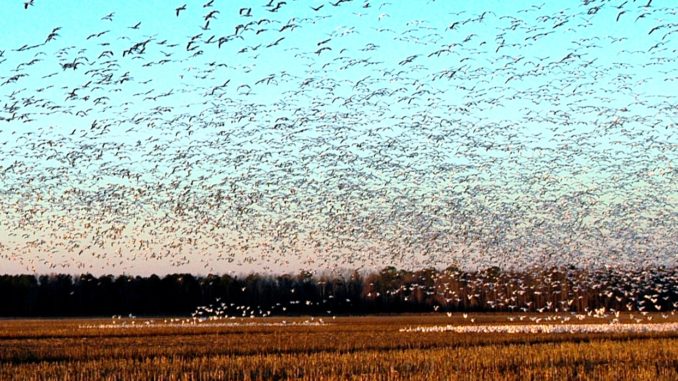
SWAN QUARTER, N.C. (March 20) – More than 200 people showed up Monday night to voice opposition to a proposed military jet landing strip in eastern North Carolina, including leadership from the N.C. Wildlife Resources Commission.
The auditorium of Mattamuskeet Elementary School was packed for the U.S. Navy’s first of six public hearings on a proposed Outlying Landing Field (OLF) site in Beaufort and Washington counties. Numerous civic leaders, citizens and public officials made their concerned voices heard, raising environmental, social and economic issues.
One such speaker was the Wildlife Resources Commission’s deputy director, Gordon Myers.
“We are not talking about minor inconveniences, nor are we talking about small adjustments,” said Myers, speaking on behalf of the Commission. “We’re talking about enormously detrimental impacts to migratory waterfowl patterns for one of the largest and most magnificent wintering grounds for migratory waterfowl along the entire Atlantic Flyway.
“This issue is not about a preferred habitat or a preferred way of life,” he continued. “It’s about essential habitat and a sustainable way of life, the destruction of which threatens the numerous activities that provide solid and balanced economic benefits to North Carolina.”
In addition, the hearing marked the U.S. Fish and Wildlife Service’s break in silence on the topic, as the federal agency declared its opposition to this OLF location.
Dale Hall, the director of the Fish and Wildlife Service, was concerned that high noise levels and frequent flyovers from Navy jets would consistently disturb the birds.
“We appreciate that (the Navy) came to us on this project, but we must respectfully disagree with their conclusions,” Hall said. “We think we have been fairly clear with our concerns and the risk involved both to wildlife and Navy pilots, but we don’t think the Navy has concluded well regarding our concerns.”
In addition, Hall said no one was sure how the birds’ migratory patterns would be altered, a potentially serious ramification.
“The only thing that is certain in nature is that nothing is certain,” he noted.
The Navy’s desire to place an OLF in this location has drawn widespread opposition. The proposed site would be within 3.5 miles of the Pocosin Lake National Wildlife Refuge, which harbors hundreds of thousands of large migratory waterfowl in the winter, chief among them tundra swans and snow geese. Called a “globally important bird area” by Hall, the refuge also generates considerable income for the local economy through eco-tourism, hunting and fishing.
The Navy has also received criticism for its proposed measures of managing the birds, which includes the use of the controversial chemical Avitrol, the effects of which have never been studied on large waterfowl.
Other public comments touched upon the displacement of local farmers with generational ties to the land, jets dumping excess fuel on low-lying terrain with an extremely high water table, and the Navy’s apparent reluctance to seriously consider the merits of other locations.
Monday’s event was the first of six public hearings scheduled by the Navy. The final hearing will take place on April 4 in Plymouth.


Be the first to comment